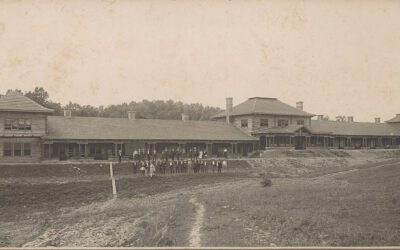[title subtitle=”WORDS Dwain Hebda
IMAGE Jade Graves Photography”][/title]
Somewhere in Arkansas tonight, a child gets off a bus or climbs out of a stranger’s car or just hunches against a wall, feeling their feet hurt. They’re hungry, and if this is their first time on the streets, a little scared. They look around as the cold reality of their decision to run away begins to really sink in, not knowing what to do first.
Most of them try to act like they belong here but there’s a look, a mannerism shared by the people used to street life, even the younger ones that don’t want to be found, who can’t or won’t go back. Those that see in the dark in ways the new arrivals don’t. The other ones are betrayed by the youth of their faces and the darting of their eyes for what they are – prey.
Janice Justice has spent the last forty-four years tending these lost sheep in Fort Smith through Comprehensive Juvenile Services, Inc. She came aboard one year after the organization was incorporated and has served the last three years as the group’s executive director. There isn’t much that can walk in between the ages of eight to seventeen that she hasn’t greeted at the door.
“It’s such a big range these days, just a variety of reasons,” Janice says to explain why kids run away. “They could have had trouble at school, they could be upset with their boyfriend or girlfriend. There’s just all kinds of reasons. It’s not necessarily because they’re bad kids. They are kids who don’t realize the dangers that are out there for them when they do run.
“Some of them have a plan, others don’t. A lot of times, their plans come from somebody they met on social media, I think. They think whoever that is is going to be their person to help them out of whatever they don’t want to be in anymore. I think the biggest thing that has really taken off and influenced kids today is the internet, social media, those kinds of things. They’re just so disconnected from the people in their own home, but they’re so connected with the outside world. Sometimes that can be in a really scary way.”
Janice balks at the two broad categories into which most people sort every runaway – either fleeing abuse and dysfunction or they’re simply a bad kid – neither of which is accurate in one hundred percent of cases.
“I don’t know that I can give you percentages or not, but we do deal with a lot of kids who are what I call typical teenagers,” she says. “Teenagers, because of the spot they are in in their lives, are on their way to becoming an adult and they’re going for their own independence. They are trying to become adults. It’s hard for parents, because you want to keep your child a child and they rebel. They think they need to be calling the shots, kids do, and the parents don’t. It’s just typical stuff that most families go through.
“We see a lot of kids who are just struggling to get along at home for that very reason. They see themselves as almost adults or as adults and their parents don’t. There’s where the conflict comes in and it happens in most every family, maybe not to the extent where they run away, but we do see that.”
Runaways get the lion’s share of the public’s attention – runaway prevention even has its own awareness month, in November – often because these are the kids most people think about being at highest risk for predators and trafficking. In fact, they represent a very small percentage of the kids Comprehensive Juvenile Services serves through its programs and its Western Arkansas Youth Shelter (WAYS), a cramped, leased space in Cecil, Arkansas.
For every dozen or so runaways every year who see the light and come in for a shower, a bed and a bus ticket home, there are more than a thousand who are at-risk or have no home to go back to. These youth, Janice says, make up the bulk of the nonprofit’s work, whether housed in the shelter or not.
“Runaways and the shelter are just a very small portion of what we do,” she says. “We have services which will connect them with any resources they need. We have case workers in our six-county area. We also have our Sanctions Program which is community service. If kids have been in trouble with the law and they are ordered to do so many hours of community service, we have workers who supervise them while they do that, or we reach out to other nonprofits for supervision in partnership there.
“We work with juveniles who have been sent away for treatment and come back and we provide their after care. We subcontract with a girls shelter in Fort Smith; all the girls you see at the girls shelter came through our case workers.”
Comprehensive Juvenile Services also invests time and resources into proactive programs, things that are designed to help head off issues before they start or give the youth a fighting chance at a productive future.
“We have a workforce program where we help older teenagers find a job, covering the basic skills you don’t really learn in high school,” Janice says. “We teach them how to complete a résumé, fill out a job application, how to look for a job, how to interview correctly, how to dress correctly. We really work to help them find a job.”
Perhaps the most ambitious prevention program is also one of the newest and something of which Janice is most proud.
“The latest, most exciting one that we have started in the last few years is our Strengthening Families Program, currently being held at Central Christian Church in Fort Smith” she says. “The idea is to foster better communication between members in the entire family.
“In this program, the entire family starts with a free meal that we provide where they sit around a literal dinner table. We take their cell phones away and they learn the lost art of communication around the dinner table. After they eat, the parents go into one session and the teenagers into another. They learn similar things in their sessions, in a different way that’s geared toward their ages. Then they come together for a family practice time to do activities and things related to what they’ve learned.
“It’s all about better communication, treating each other in the way you’re supposed to be treated. It’s been really successful. Our courts have been very supportive and are sending us a lot of families. We’re currently working with about twenty families in the current session.”
Dealing with children and families in crisis can be taxing work, especially over the course of a long career. But these days, there’s hopeful things on which to focus, such as the drive to open a new shelter, one that is larger and more accessible, for the organization’s youth. That effort took a big step forward recently and Janice hopes the community will continue to respond to the group’s capital campaign needs to raise the funds necessary to create a space that is a beacon of welcoming and hope.
“Recently been very blessed. We have had a building donated, the former Dollar General building in Mulberry, Oklahoma” she says. “The location is so much better because it’s accessible to Interstate 40 which will make it more accessible to runaways for sure and also right there on Highway 64. Right now, it’s just a big box and we are basically building a shelter inside there.
“We still need a considerable amount of money; I believe the latest estimates from the architect is $1.8 million as the total that we need. We currently have about $850,000 to go toward that, we just need to try to raise the remainder of it. We hope the community will help us turn that into our youth shelter. We are very excited about it.”
Runaway Hotline: 1.800.508.2946
Comprehensive Juvenile Services
1606 South J Street, Fort Smith, Arkansas
479.785.4031




